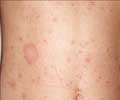- Clinical trial results show promising evidence that use of fluorouracil 5% (5-FU) reduces risk for keratinocyte carcinoma skin cancer.
- Usage of the skin cream for just one month offers continued protection and risk reduction for up to one year.
- A statistically significant 75 percent risk reduction was observed in high risk individuals who were given 5-FU compared to those who received placebo.
The Trial
The Veterans Affairs Keratinocyte Carcinoma Chemoprevention Trial was conducted between 2009 and 2013, where 932 veterans who had at least two prior basal cell carcinomas (BCCs) or SCCs were selected. Each one was randomly assigned to either receive the 5-FU cream or another cream but without the active ingredient.The veterans were instructed to apply the cream twice a day on their face and ears for up to four weeks. They were also given a 30 SPF sunscreen and skin cancer information. The two groups were similar on all accounts other than the cream that they received. Both groups were almost exclusively white and male, with an average age of 71. Also, veterans typically have spent a large amount of time in the sun during their years of service and had the same self-reported degree of prior sun exposure and sunburn.The veterans were asked to visit their centers twice a year for two years for a follow-up with a dermatologist.
Study Findings
At the end of the first year after treatment initiation, 20 of the 464 veterans who received the placebo cream had developed a squamous cell carcinoma that required surgery. However, in the group that received 5-FU only five of the 468 veterans developed the cancer. The research team noticed a 75 percent risk reduction in the group that received 5-FU.Among veterans who had a previous history of basal cell carcinoma (BCC) and received 5-FU, 11% risk reduction was noticed after the first year. However, this was not statistically significant. Overall, after four years of treatment initiation, 298 of all participants developed at least one BCC, and 108 had developed at least one SCC.
"This suggests that using the 5-FU can reduce the resources needed to treat these carcinomas," Weinstock said.
"The most remarkable thing about this study is that now we have something to use that doesn’t lose its effectiveness when you stop using it," Weinstock said. "But this is the first study of its type. I’m hopeful there will be other studies that show other sorts of regimens that last longer and do a better job over time as science progresses. This is an important first step."
Side effects of the skin cream
The cream does have common side effects like causing redness, itchy, sensitive and crusty skin, but these reduce once the application of the cream stops. At the end of 6 months of the cream treatment, 21 percent of the 5-FU group rated the side effects as "severe," and 40 percent rated them as "moderate."Weinstock and colleagues are planning further studies, including one to determine the cost-effectiveness of 5-FU treatment.
Reference:
- In clinical trial, cream reduces squamous cell carcinoma risk - (https://www.eurekalert.org/pub_releases/2018-01/bu-ict010318.php)
Source-Medindia















